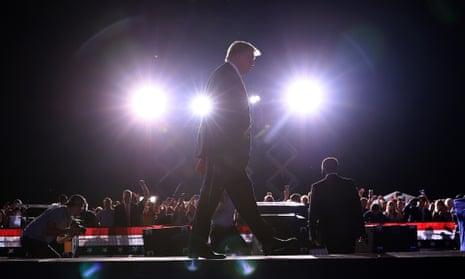Donald Trump has suffered a series of legal setbacks and more loom, as he wages a court battle to thwart a House committee from obtaining White House records for its inquiry into the 6 January Capitol assault and a new grand jury begins hearing evidence about possible crimes by his real estate firm.
Former justice officials and legal scholars say Trump’s long-standing penchant for using lawsuits to fend off investigations and opponents is looking weaker now that he’s out of the White House and facing legal threats on multiple fronts.
The list of significant legal setbacks is lengthy for the former president and real estate mogul who has long had a reputation for threatening to sue his foes.
Early this year, for example, Manhattan district attorney Cyrus Vance Jr won a lengthy legal fight to obtain Trump’s tax returns, and in July charged two Trump companies and the Trump Organization’s chief financial officer with a 15 year tax fraud scheme, which the companies and the CFO have denied in pleas.
On 4 November, a second grand jury was convened by Vance to hear more evidence about the financial practices of the Trump Organization and possibly bring more charges, according to the Washington Post.
Trump suffered another legal setback when a New York court ordered him to give a deposition in October that lasted more than four hours in an old lawsuit by men alleging they were attacked in 2015 by Trump security guards at a demonstration outside Trump Tower in Manhattan.
Meanwhile, in his latest high stakes court fight, Trump’s attorneys have launched a legal blitz invoking executive privilege to block the House select committee from obtaining hundreds of pages of documents from the National Archives the committee seeks as it investigates the 6 January Capitol riot and what role Trump played in it.
A federal judge at a hearing on Trump’s legal challenges on 4 November voiced strong scepticism about his lawyers’ executive privilege claims to keep the committee from getting most of the records it wants, noting that President Joe Biden approved turning them over.
Trump’s many reverses in court and his efforts to blunt the bipartisan House committee’s inquiry, underscore the growing legal threats Trump is facing that pose new financial and political risks, say former justice department lawyers and legal scholars.
Historically, Trump has relied on lawsuits as a delaying tactic to benefit his business interests, or to claim executive privilege or immunity to stymie congressional, state and other investigations when he was president, according to legal analysts.
Likewise, after his loss to Joe Biden last year, Trump’s campaign and allies filed more than 60 lawsuits claiming widespread fraud that were rejected by various courts.
To back his fights Trump boasts a legal arsenal with a shifting cast of lawyers, in part because Trump has been rebuffed by several high-profile attorneys this year, according to a CNN report and legal sources.
“Trump is going pretty deep down the bench to find lawyers,” said one former DOJ prosecutor and GOP white collar attorney. “I think a lot of established lawyers would have trouble getting approval from their firms because of political blowback and risk of non-payment.”
DoJ lawyers and experts say that Trump’s legal fortunes now look grimmer, and that his current battle royale to block the House inquiry into the Capitol riot by his allies seems quite weak, though it may delay the inquiry for months.
“Trump’s current assertions of a privilege against the disclosures are almost identical to the baseless claims of an absolute immunity that he advanced repeatedly – and the supreme court rejected – when he was president,” said Donald Ayer, a former deputy attorney general in the George HW Bush administration, in a Guardian interview.
Ayer added that “Trump is just blowing smoke and trying to throw sand in the gears of the select committee investigation. Congress, the administration, and the courts need to quickly and emphatically say no and press ahead with the investigation.”
Other DoJ veterans agree that Trump’s legal case looks flimsy, but say it could stall the House inquiry.
“The executive privilege claim against the National Archives is extremely weak,” said former federal prosecutor Paul Rosenzweig. “The question is whether he can game the system to run out the clock and make the requests moot.”
That may well be the point. Trump’s regular use of litigation to delay federal and state inquiries echo his modus operandi when he was president and in the business world, say experts.
“Likelihood of success on Trump’s legal claims is not always or often the primary goal,” said Stephen Gillers, a law professor at New York University. “The primary goal, at least for the farfetched claims, is delay. If there’s also a partial victory, so much the better.”
More legal battles are pending for Trump, including claims by two women, ex- Apprentice candidate Summer Zervos and writer E Jean Carroll, who, respectively, have alleged they were sexually harassed or raped by Trump, charges he has denied.
Zervos has sued Trump for defamation and Trump, who has threatened to counter sue, faces a court order to sit for a deposition by Christmas. Similarly, a New York judge in September denied a Trump lawyer’s request to pause a defamation lawsuit by Carroll against Trump.
But Trump’s legal armada now seems focused on blocking White House records from the House committee investigating the deadly 6 January attack on Congress, which followed a Trump rally where he told a large crowd of loyalists to “fight like hell”, as Congress was poised to certify Biden’s win.
Trump’s legal tactics fit his old playbook. “He is behaving now as he long behaved as a real estate investor and builder in the high stakes and often vicious world of New York commercial real estate,” Gillers said. “When the same tactics are employed in national politics, the victims are democracy and the nation.”
